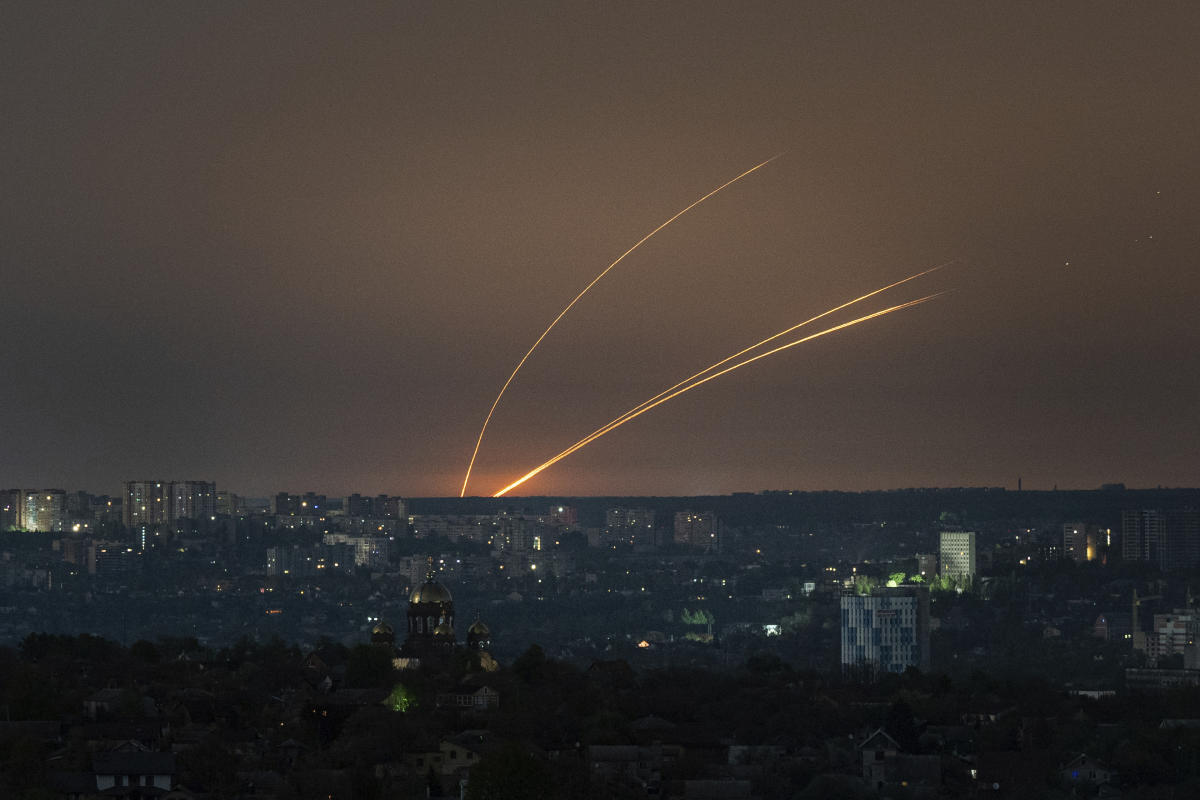KHARKIV, Ukraine (AP) — A 79-year-old woman makes the sign of the cross and, holding her cane, leaves her home in a picturesque village in northeastern Ukraine.
Torn screens, shattered glass and scorched trees litter the garden of Olha Faichuk’s apartment building in Lukiantsi, north of Kharkiv city. On a nearby bench lies a shrapnel-pierced mobile phone that belonged to one of the two people killed when a Russian bomb struck, leaving a blackened crater.
“God, forgive me for leaving my home, bless me on my way,” Faichuk said, taking one last look around before slowly shuffling toward an evacuation vehicle.
Unlike the embattled frontline villages further east, attacks on the border village near Russia’s Belgorod region were rare until a wave of airstrikes began in late March.
Russia has apparently exploited the air defense shortage in Kharkiv, Ukraine’s second-largest city, to destroy the region’s energy infrastructure and terrorize its 1.3 million residents. Nearly 200,000 city residents remain without power, while 50% of the region’s population continues to experience power outages, officials say.
As utilities scramble to meet electricity demand before winter begins in six months, Russia continues to unleash deadly hover bombs to drive out more residents. Some officials and analysts warn it could be a concerted effort by Moscow to create the conditions for a summer offensive to capture the city.
Oleh Syniehubov, the governor of the Kharkov region, acknowledged the need to strengthen air defenses, saying: “We clearly understand that the enemy actually uses this vulnerability every day.”
The battle in Kharkov reflects a broader problem: As Western allies drag their feet on delivering promised aid to Kiev, Moscow is patiently escalating until, they hope, Ukrainian resistance breaks.
30 SECONDS
The attacks, which began on March 22, destroyed Kharkov’s ability to generate and distribute electricity.
Missiles fired from Belgorod take 30 seconds to reach their targets in Kharkov, just 30 kilometers away, which is about the same amount of time it takes air defense systems to respond. During the latest barrage, Russia simultaneously launched 22 missiles to swarm and disorient the defenses, Syniehubov said.
Energy workers also had just 30 seconds to find cover.
At CHP-5, a power station in Kharkiv that generates electricity and heat, the sharp smell of smoke still lingers. According to plant manager Oleksandr Minkovich, the damaged generator and turbine need to be replaced.
The plant provided 50% of the region’s electricity and 35% of the city’s heating, Minkovich said. It has been attacked six times since the Russian invasion began, but the latest barrage destroyed “any possibility” of energy generation, he said.
Spare parts for the Soviet-era factory can only be sourced from Russia, and a full restoration would likely take years, he said. But Minkovitch hopes Ukraine’s Western partners will provide modern technology to decentralize power in time for winter.
Without it, he says, he’s not sure how to meet demand.
To keep the lights on, power is diverted from neighboring regions to Kharkov, but this process overloads the electricity grid and causes unplanned power outages. Companies rarely know when and for how long they can rely on the electricity grid.
“We wake up every day and have no idea whether we will have power or not,” said Oleh Khromov, the owner of a popular Kharkov restaurant, Protagonist.
PRICELESS HOUSES
Of the dozens of former residents, only ten remain in Faichuk’s apartment building in Lukiantsi.
“Why are they killing us?” Valentyna Semenchenko, 71, said she cried as her friend was driven away.
Serhii Novikov, a volunteer with the NGO ‘I Am Saved’, which organizes evacuations, said the increase in Russia’s use of hover bombs is making more and more communities near the border with Belgorod uninhabitable.
If a bomb falls even close to a house, that “house is not fit to live in because the shock wave is so big that it destroys everything in its path,” Novikov said.
Yulia Shdanevych made the painful decision to leave her home in the nearby village of Liptsi after two adults and a child were killed in an airstrike on April 10. Previous rocket and mortar attacks caused no deaths, but that changed with the introduction of aerial bombs.
“Before they would focus on one production building,” Shdanevych said. “Now it’s like they’re attacking civilians directly.”
There was no power at a shelter in Kharkov when Shdanevich arrived, and she filled out paperwork by the light of a battery-powered lamp. Director Ihor Kasinksy said the facility is experiencing power and water outages.
Before the war, 2,000 people lived in the village of Rubizhne, 14 kilometers from the Russian border. Today only sixty remain, including Olha Bezborodova. But she doesn’t know how long she will stay.
“It’s very difficult. If we had light, it would be easier,” Bezborodova said, cradling her toddler. She said organizations have helped her repair her house, “but they (the Russians) are not done yet, they bomb all the time.”
THE RESISTANCE
Ukrainian officials are divided over the significance of the recent attacks on Kharkiv.
President Volodymyr Zelenskiy has said it is no secret that Russia wants to take over the region, but Ukraine’s military intelligence is calling rumors of an upcoming offensive a “psychological operation” to sow panic. Analysts argue that a bigger offensive cannot be ruled out, pointing to the intensity of the recent attacks.
Ukraine is not taking any chances and has built fortifications on the outskirts of the city.
Oleksander, an engineer at a company involved in that work, said crews dug anti-tank ditches, laid dragon’s teeth and built a network of trenches to keep Russian forces at bay. For security reasons, he was not allowed to reveal his surname or that of his company.
He has a deadline of early May to complete the job. “We’ll be on time,” he said.
Meanwhile, cafes and restaurants remain busy in Kharkiv, where locals have become accustomed to being heard above the roar of generators. In Protagonist, an alternate menu provides options for ordering when the power is off.
“The people who stay here and keep businesses open and try to do something are not tragic figures with nowhere to go,” Khromov said. “They are a special breed of perverted enthusiasts who are trying to make sense of it all, who are still interested in building something.”
At a nearby bakery, workers manually record sales so they can ration energy to keep food cool.
“We are trying to deal with it,” said Oleksandra Silkina, 34.
“We have been under constant attack since 2022, so we are used to these attacks,” she added. ‘We will not leave this city. It is our city.”
___
Associated Press journalist Volodymyr Yurchuk contributed from Kharkiv.






